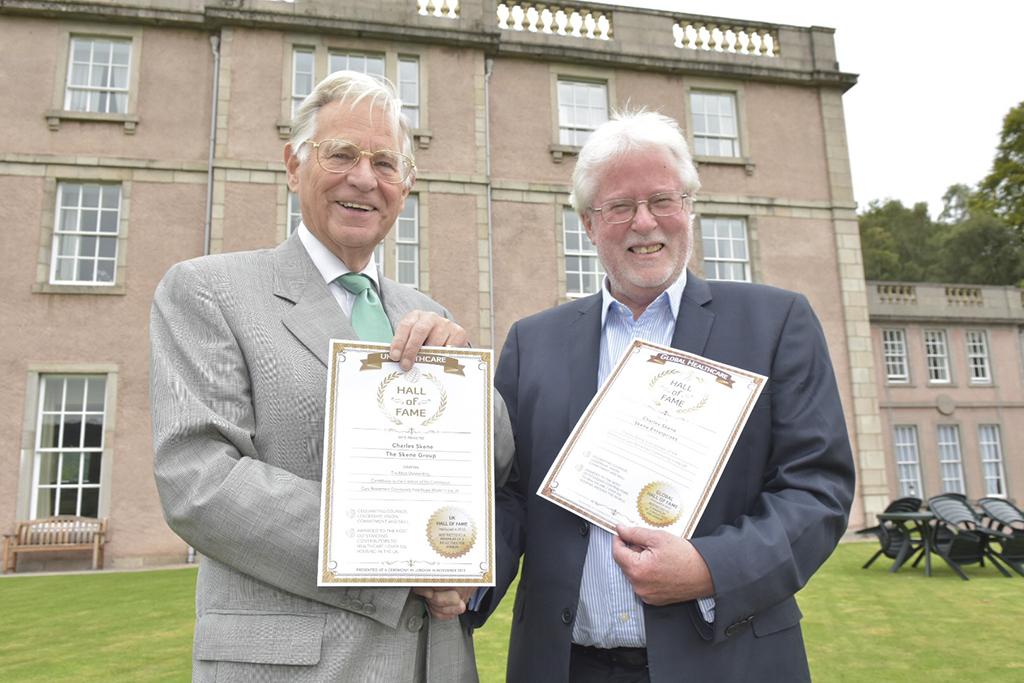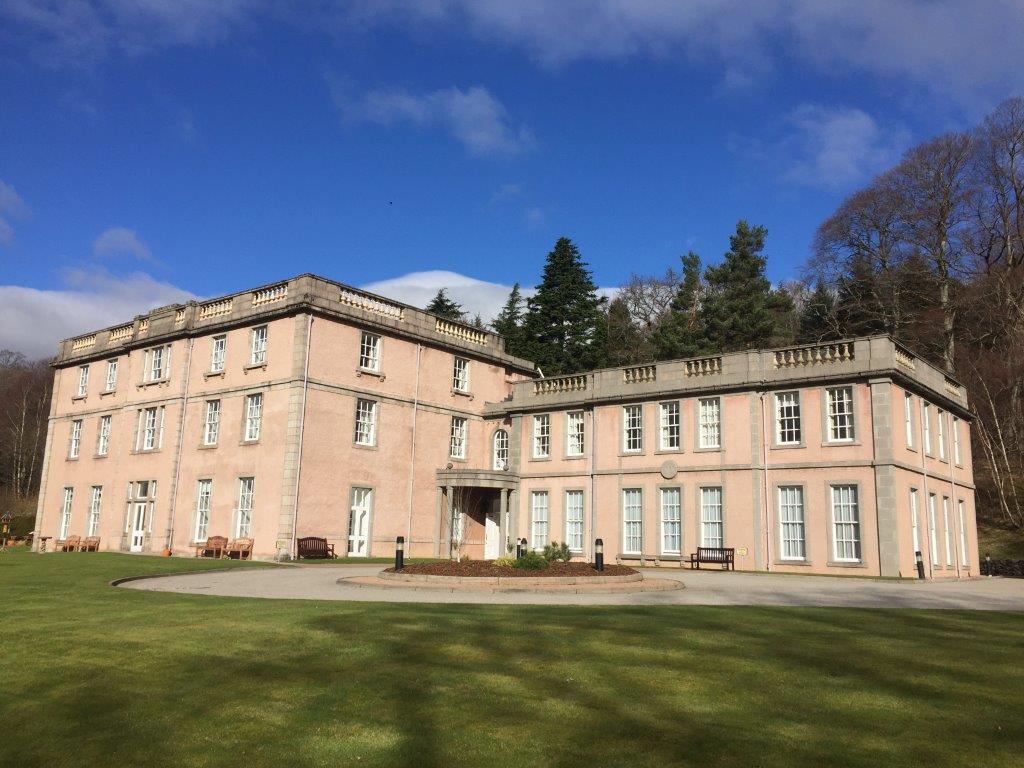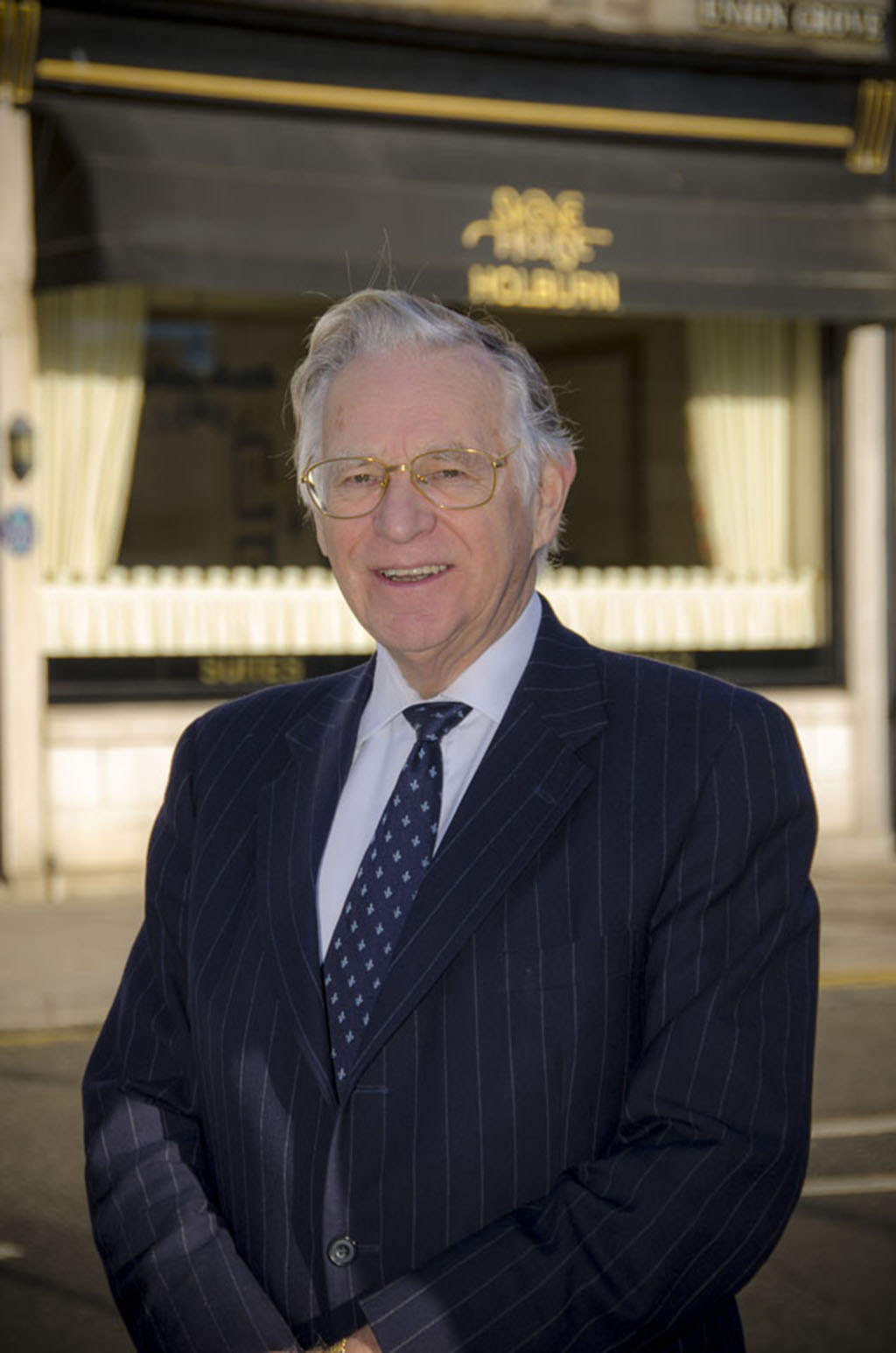
The Scots businessman inspired by Andrew Carnegie
Professor Charles Skene OBE has a near lifetime experience in the business world.
He entered into the business sphere after leaving school at 16 and, with the exception of two years National Service, has been committed to the industry ever since. Charles returned to the family business – the photographic firm Studio Morgan that specialised in weddings and portraiture – at the age of 20. By the time he reached 24, he had expanded the number of staff in the business from just two to 18.
‘I took over the running of the wedding photography department and astonished my parents by exhibiting entrepreneurial ability. There’s no other way of putting it – they and the rest of my family never thought I had that ability whatsoever.’
Charles had no formal education in business but explains that ‘it never entered my head to do anything else or to go to university to do a degree’.
Not only inspired by the family business to venture into the business sector, he also took great inspiration from the business magnate, industrialist and philanthropist Andrew Carnegie. While in Portsmouth as part of his National Service, Charles came across Carnegie’s biography and was struck by its brilliance.
Charles explained: ‘I was absolutely overwhelmed by his life as an entrepreneur and philanthropist. I was completely overcome by what this poor boy from Dunfermline managed to do with only one and a half years of education.’
It was Carnegie’s tale of his father losing his weaving business when cheap imports came across from India and forced the family to immigrate to America that struck Charles so profoundly. This difficult background heightens the respect felt for Andrew Carnegie and his achievements in the business world. Charles took great inspiration from this remarkable man and has been dedicated to this domain ever since.

Professor Skene (left) receives the award for the most outstanding retirement community in the UK
Professor Skene now has three main businesses and is still expanding. The first is Skene House Hotel Suites which celebrates its 40th anniversary this year. This business was set up to provide accommodation for the families and individuals that relocated to Aberdeen in the 1970s. These serviced apartments accommodate families together rather than spreading them across several different rooms as hotels do. The first block to be converted into serviced apartments was in Rosemount which began with eight deluxe two and three bedroom apartments. The company now has 181 apartments, an extraordinarily large expansion that comes as no surprise given that Skene House Whitehall was awarded number one on TripAdvisor in Aberdeen for five years, with the other two houses, Holburn and Rosemount, only a couple of places behind.
The second business that Charles and his team run is Inchmarlo Retirement Village. This started up in 1986 and is comprised of nine neighbourhoods and over 200 homes on a 100 acre estate. The houses are for over 55 year olds and range from one bedroom apartments to four bedroom detached houses with their own driveway and garage. The Georgian B-listed mansion, Inchmarlo House, remains at the centre of the estate and houses 52 beds in the 5 star care home.
‘Anyone over 55 years old can buy a house from us after a meeting with our matron to see they are sufficiently fit to live on their own with some support when it’s required,’ explains Charles. ‘We were the first in Britain to do this full continuing care retirement community and it works well.’
As well as outstanding reviews from TripAdvisor for Skene House Hotel Suites, Charles and his team have managed to obtain excellent views for their Inchmarlo business, too. In October 2018 the Sunday Times said: ‘Inchmarlo Retirement Village, one of the first and still one of the best in the UK. Buyers from all over the country have been moving in here since 1986, confident that they can stay as long as they need.’
The UK’s over 50 Housing Awards 2016 said: ‘Inchmarlo Retirement Village, the most outstanding continuing care community in the UK’.
The context surrounding the setup of Inchmarlo Retirement Village meant that its establishment was particularly unusual. This was at a time where houses were worth less and people were unable to move out and buy a property in the retirement village. It was here that Professor Skene decided to take a rather unusual approach to help his business. He decided to expand.
‘We bought the Cowdray Club and turned it into a 75-bed care home in Aberdeen. And then we bought a care home in Forres and doubled the size of it to 60 beds. We then won the contract to design, own and manage the official care home for the elderly in Elgin on behalf of Moray Health Trust.’

Inchmarlo is astute in its services to guests and homeowners. It is fitted with 24-hour security so if someone has a fall in their own home they can press a bell which will send a security warden to their aid. In addition to this, they also provide meals on wheels and have a very wide menu in the village. Over the years Charles has organised 43 tasting dinners where he and the head chef go over the menus and choose recipes from different chefs and restaurants.
‘We usually select six dishes: two starters, two main and two desserts, and invite our homeowners to attend and fill in forms at the end of each course. I read them out and then we decide which ones to add to the regular menus.’
Charles’ experience in the food industry is a prestigious one as he is a regular visitor to the likes of The Ritz, Claridges, and The Savoy and has eaten in two and three Michelin star restaurants in places like Paris throughout his time. This ensures that he helps choose a menu of exceptionally high quality.
The flexibility of services at Inchmarlo is yet another way in which it is such a unique and esteemed organisation. Upon purchasing a home in the retirement village, homeowners can add on services as their needs change. This allows them to continue living in their homes with additional ease and considerable financial savings as they can live there longer than might be the case elsewhere.
The third business is one Charles set up in 1983 called Serviced Offices. This developed from the days of early marriage where, instead of buying a house or a flat as most newlyweds do, Charles bought a hotel comprised of three buildings in the West End of Aberdeen. This hotel had 60 rooms and Charles converted it into a large flat for him and his wife, another for his mother, a studio and then rented out the additional space. Six years after this, Charles converted a former hotel in Queens Gardens into Serviced Offices. Not only are these still running but he also just bought two more buildings in the same area, adding another 100 guests and expanding the company dramatically.
As well as establishing and running businesses, Charles set up the Young Entrepreneurs Award which ran for 18 years. This was an award for primary and secondary schools encouraging young interest in business and entrepreneurship. In the National Awards for primary schools and secondary schools, the most outstanding Enterprise within primary/secondary schools in Scotland received £1,000, The Scottish Gas Trophy, An Award Certificate to be retained by the school, Individual Certificates for each pupil and Presentation packs of special stamps for one year for each member of the Enterprise from Royal Mail Stamps and Collectables (primary schools only).
The winners also got so spend a weekend in Gleneagles with their teacher and up to 16 pupils as well as a number of other prizes. Charles and his secretary, Helen Fitzpatrick, went around five areas in Scotland every year handing out the awards for the mini enterprise, young enterprise and national awards. The event was a prestigious one held at the Royal Society of
Premises in Edinburgh or Glasgow and welcomed individuals like Prince Philip, Tom Hunter, Tom Farmer, Brian Souter and lots of ministers and government ministers. This scheme was invaluable to the promotion of business in education and in teaching children about enterprise and entrepreneurship.
The scheme has since changed hands and with that, changed from what it was originally established to focus on: enterprises operating in schools.
In 1986 the Royal Society for the Encouragement of Arts, Manufacturers and Commerce (RSA) in London concluded that Britain, the first and great industrial nation in the world, had become an industrial nation with an anti-industry culture. They persuaded the government to declare 1986 as ‘Industry Year’ and a small number of people from Britain were appointed from their local areas. Charles was appointed to run the anti-industry for the Aberdeen area with no programme, funds or guidance whatsoever.

Charles Skene, pictured at Skene House
He decided to set up two committees and ended up having the most successful area in Scotland, hosting lunch for 1000 secondary pupils in the AECC in Aberdeen and inviting John Garnett from the Industrial Society to speak to them. Charles also persuaded Grampian television not to hold the Thanksgiving lunch for the Harvest they had run for 150 years but instead, they held one in Hall Russell’s shipyard and gave thanks to industry. This was broadcast throughout the entire ITV network and he linked every primary and secondary school in Grampian to two companies and went to speak to various teachers and pupils involved.
It was whilst he was doing all of this that Charles concluded that in Britain, in addition to having an anti-industry culture, we also have an anti-enterprise culture. Hence the establishment of the Young Entrepreneurs’ Award.
Businesses in the north east face the dreadful challenge of the revaluation of business rates. Charles explained that his three Skene Houses in Aberdeen had their rates increased from £280,000 per annum to £704,000 per annum; an increase of 150%. Similarly, another successful businessman in Aberdeenshire had his business rates increased from £375,000 to £1.4 million. Most hotels in the north east of Scotland welcomed incredibly high occupation/percentage occupancy during the major oil boom but in 2015 the oil crashed again and businesses have since been going bust and losing money.
‘It’s not only the business rates that are doing this, there are two more things; firstly, the downturn in requirement for accommodation because there are fewer oil industry people coming in here. Aberdeen doesn’t have a vibrant tourist industry like Edinburgh and certain other places do, so the hospitality sector is going through an extremely tough time. Secondly, there are far far far too many new hotels opening up all over the place.’
The pressure on businesses to compete with each other and the increasing number of hotels popping up around the country as well as with the business rates doesn’t fare well for business.
Professor Skene has been awarded both an OBE and a CBE and was one of the first ten people in Britain to get an award from Her Majesty for Enterprise Promotion. He has also been Aberdeen Chamber of Commerce president, continuously elected member of the CBI Scottish Council for 30 years and a visiting professor of entrepreneurship at Robert Gordon University for 15 years.
Charles still works full time and his three children are all involved in the business, working for him part time. This maintains the charm of the family run business and adds to the personal touch the businesses have in the execution of their work and services. His dedication to enterprise and entrepreneurship has made an invaluable and lasting impact on the business industry, particularly through teaching children and young people and founding safe and comfortable accommodation for families and for the elderly.
TAGS

